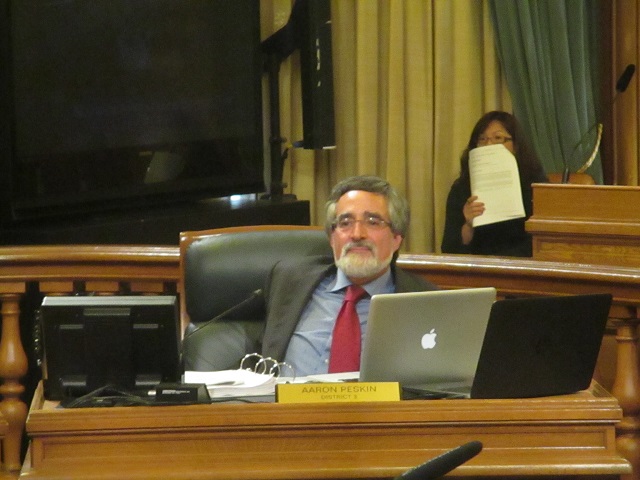The mayor will have to work with progressives — and might have to make some tough decisions

By Tim Redmond
DECEMBER 10, 2015 – I ran into Sup John Avalos Tuesday, right before the Board meeting, and he had a big smile on his face. “Now,” he told me, “we can legislate.”
Beyond all the headlines about the jail (which Peskin has not taken a public stand on) and the bicycle laws (again, he said Tuesday he hadn’t had time to review the ordinance yet), what Avalos was talking about it probably the biggest immediate impact of Peskin’s return to City Hall.
Progressives have been stuck of late playing a lot of defense, trying to stop bad things from happening. Although we’ve seen some amazing victories (Eviction 2.0 and the Campos Ellis Act payments laws got enough votes to pass and avoided a mayoral veto), it’s often been hard to count to six.
That, among other things, has been a huge benefit to the mayor, who can continue to claim that he supports tenant rights and is worried about affordability because measure that might have put him in a tough spot never make it to his desk.
(One example: It’s entirely likely now that the supes will pass a measure forbidding Airbnb from posting unregistered and thus illegal units. A mayoral veto of that would look terrible. A mayoral signature would infuriate Lee’s tech allies, especially Ron Conway. Another: The fees that developers pay for transit may come back before the board, since some progressives think they are way too low. You want a public referendum on the question of whether rich real-estate developers should pay more for better Muni service? Good luck vetoing that one, Mr. Mayor. More: The Affordable Housing Density Bonus has a lot of problems, and the board will be asked to remove rent-controlled housing from potential demolition.)
Peskin made it clear that he expects an active year: “The city government hasn’t been doing enough to ease this [housing] crisis,” he said. “There is much more than we can and should do.”
He also has a history of organizing ballot-measure campaigns, both in and out of office.
The chambers were packed with Peskin supporters, who applauded when he walked in. And his victory has been a huge boost to progressive morale.
But as my podcast partner Tom Ammiano notes, it’s a mistake to think that one person will by himself make dramatic changes on the board. The community that put Peskin in office will have to stay organized (while working on at least half a dozen other big races) and Peskin will have to work to make sure that the six-vote majority holds together on key issues (that’s something he’s good at).
So the mayor won’t be getting a free pass this spring. He will, for the first time since he took office, have to partner with the left flank of the board if he wants to get anything done. That alone will change the tone of local politics.






